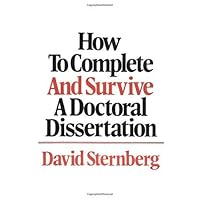
Average Reviews:

(More customer reviews)The most interesting implication of this book to me is one the authors do not state: If the United States succeeds in increasing the % of citizens who attend AND graduate from college, the wage premium for college graduates will decline. The wage premium is rising largely because high-end universities are not growing enrollment, ensuring a supply/demand imbalance. High achievers capture a disparate share of the degree-wage premium. And the bulk of those high achievers come from a short list of "name" universities that get first pick of students. Do America's top 100 universities have any interest in growing the number of educated Americans? Hardly. Their pace of enrollment growth has been glacial for many decades.
The authors briefly argue against diminishing returns, citing anecdotal studies but not confronting the larger numbers that would be involved if they got their wish. This book carries on the attitude of the more, the better, because it's all about trying to understand why the % of students who finish college is not going up. It's stuck at 50%--45% for public schools, 55% for private.
The authors don't want that diminishing-returns debate, for they are fixated on the persistence of social and economic inequality. Their massive statistical analysis of the incoming class of 1999 shows that if your parents were poor and didn't attend college, you have a low chance of finishing college in six years regardless of your high school record. People in the top quartile of incomes have a better than 50/50 chance of getting a bachelor's degree by age 26; only about one in 10 from the poorest 25% of US families did so.
Inequality is reinforced by state flagship universities' increasingly selective admissions. The book samples UCLA, North Carolina and Virginia from 1974 to 2006; over that span the % of new students with >3.5 high school GPA rose from 55% to 90%. A similar move appeared in three other not-so-elitist flagship schools. Students from households in the top 25% of incomes are greatly overrepresented at these schools.
The authors miss the obvious explanation. Take UCLA. From '74 to '06 its undergraduate enrollment grew at a CAGR of 0.6%, less than half the rate of US population growth.
Our economy is fixated on hiring the best graduates of the same old list of schools, where the best faculty are hoarded. A smaller and smaller % of college students get to see them.
College participation is rising, rising fast in fact, but the completion rate isn't. It likely will fall due to a spike in the % of high school grads entering college, influenced by the recession's destruction of entry-level jobs.
This book is focused on the freshman class of 1999, which entered school half a year before the top of the Internet bubble. At this time, 55% of the age 18-19 population was employed, and their official unemployment rate was 12%. From the high school class of '99, the BLS tells us 63% immediately went to college (two or four-year). This was a generational low, equaled in fall 2000. Not coincidentally, the US unemployment rate dipped below 4% in 2000. Jobs were easy to get.
In fall 2009, 37-38% of the age 18-19 population was employed, and their official unemployment rate was as high as 26%. A full 70% of '99 high school grads went to college, highest on record. With a jobless rate of 10%, the labor market was ugly.
The book studies the graduation rate of the '99 class over a six-year period, on the veiled assumption that six years is long enough. Over a recession, of course, six years isn't long enough for people of limited economic means. And all they can tell is whether these students graduated from these schools--not how many had to transfer to lower-cost schools and finished there. Not how many finished in more than six years.
The Student Clearinghouse recently reported that 49% of 2005-06 college graduates finished in no more than four academic years, with about one-quarter taking more than five years, 10% more than seven. NCES reports that students who begin at two-year schools and finish at four-year schools take almost two academic years longer to finish than those who start four-year schools as freshmen. Economic strain forces people to save on college costs, which prolongs their time in college. The longer college is stretched out, the more likely one won't finish. Kids who go full-time without a worry about how to pay for it are at a great advantage.
This book's data supports the well-established fact that high schools in low-income areas do not prepare graduates well enough for college. But not as much as you might think.
The authors analyzed the quality of high schools that supplied the '99 college freshmen by college prep measures (SAT, ACT, AP). The performance spread between high/low income, high/low test scores, ethnic mixes isn't great. Surprisingly consistent. The spread between the elite state universities and other state schools, however, is remarkably wide across any subgroup. Selective admissions appears to improve grad rate by 220-300 basis points.
Further, the authors note the Chicago Consortium's conclusions that less than half of Chicago high school grads studied enrolled in colleges good enough to match their academic achievements. The authors studied their North Carolina data set and found more than 40% of '99 high school grads with excellent SAT scores + GPAs did not attend exclusive universities. They suggest these students have low expectations too early in the process, most not even applying to better schools. I ask: If they had gotten in, who would have been bumped?
Inevitably, good students will be forced into lesser schools, and many of them will be bored or shamed into dropping out. It doesn't take reams of data to tell you that.
If you read this study, you may conclude that the subsequent question is how to improve college opportunities for people who weren't excellent in high school, weren't raised by college grads, aren't made of money. This no longer is the problem of the state universities. Their capacity constraints lead them to price out and test out more and more applicants. Our country has only one source of new capacity for educating adults, the for-profit schools that the Obama administration seems to abhor. The problem of controlling for-profit schools, ensuring they teach well and award meaningful degrees, seems more manageable than finding the dollars to persuade not-for-profit schools to grow again.
Click Here to see more reviews about:
Crossing the Finish Line: Completing College at America's Public UniversitiesThe United States has long been a model for accessible, affordable education, as exemplified by the country's public universities. And yet less than 60 percent of the students entering American universities today are graduating. Why is this happening, and what can be done? Crossing the Finish Line provides the most detailed exploration ever of college completion at America's public universities. This groundbreaking book sheds light on such serious issues as dropout rates linked to race, gender, and socioeconomic status.
Probing graduation rates at twenty-one flagship public universities and four statewide systems of public higher education, the authors focus on the progress of students in the entering class of 1999--from entry to graduation, transfer, or withdrawal. They examine the effects of parental education, family income, race and gender, high school grades, test scores, financial aid, and characteristics of universities attended (especially their selectivity). The conclusions are compelling: minority students and students from poor families have markedly lower graduation rates--and take longer to earn degrees--even when other variables are taken into account. Noting the strong performance of transfer students and the effects of financial constraints on student retention, the authors call for improved transfer and financial aid policies, and suggest ways of improving the sorting processes that match students to institutions.
An outstanding combination of evidence and analysis, Crossing the Finish Line should be read by everyone who cares about the nation's higher education system.
 Get 40% OFF
Get 40% OFF
Click here for more information about Crossing the Finish Line: Completing College at America's Public Universities






















